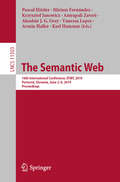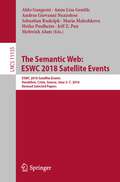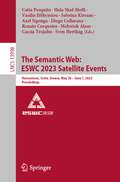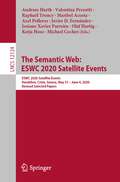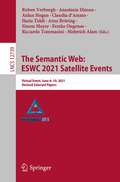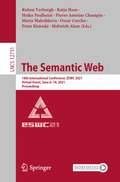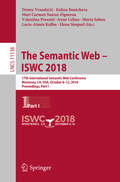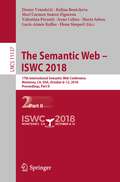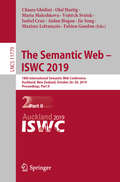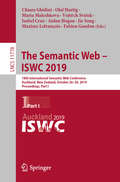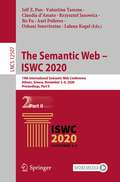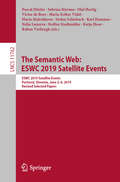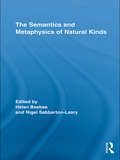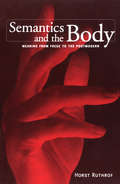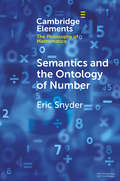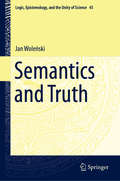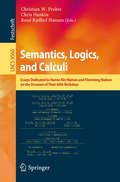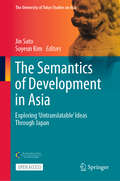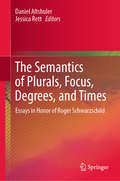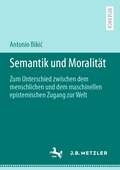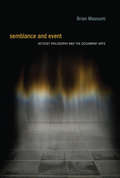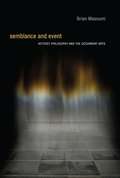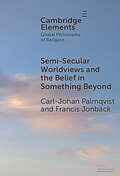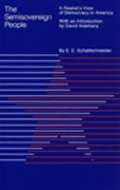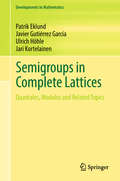- Table View
- List View
The Semantic Web: 16th International Conference, ESWC 2019, Portorož, Slovenia, June 2–6, 2019, Proceedings (Lecture Notes in Computer Science #11503)
by Pascal Hitzler Miriam Fernández Krzysztof Janowicz Amrapali Zaveri Alasdair J. G. Gray Vanessa Lopez Armin Haller Karl HammarThis book constitutes the refereed proceedings of the 16th International Semantic Web Conference, ESWC 2019, held in Portorož, Slovenia. The 39 revised full papers presented were carefully reviewed and selected from 134 submissions. The papers are organized in three tracks: research track, resources track, and in-use track and deal with the following topical areas: distribution and decentralisation, velocity on the Web, research of research, ontologies and reasoning, linked data, natural language processing and information retrieval, semantic data management and data infrastructures, social and human aspects of the Semantic Web, and, machine learning.
The Semantic Web: Eswc 2018 Satellite Events, Heraklion, Crete, Greece, June 3-7, 2018, Revised Selected Papers (Lecture Notes in Computer Science #11155)
by Heiko Paulheim Sebastian Rudolph Aldo Gangemi Mehwish Alam Anna Lisa Gentile Andrea Giovanni Nuzzolese Maria Maleshkova Jeff Z PanThis book constitutes the thoroughly refereed post-conference proceedings of the Satellite Events of the 15th Extended Semantic Web Conference, ESWC 2018, held in Heraklion, Crete, Greece, in June 2018.The volume contains 41 poster and demonstration papers, 11 invited workshop papers, and 9 full papers, selected out of a total of 70 submissions. They deal with all areas of semantic web research, semantic technologies on the Web and Linked Data.
The Semantic Web: Hersonissos, Crete, Greece, May 28 - June 1, 2023, Proceedings (Lecture Notes in Computer Science #13998)
by Catia Pesquita Hala Skaf-Molli Vasilis Efthymiou Sabrina Kirrane Axel Ngonga Diego Collarana Renato Cerqueira Mehwish Alam Cassia Trojahn Sven HertlingThis book constitutes the post-conference proceedings of the satellite events held at the 20th Extended Semantic Web Conference, ESWC 2023, held in Hersonissos, Greece, during May 28—June 1, 2023.The 50 full papers included in this book were carefully reviewed and selected from 109 submissions. They were organized in sections as follows: Posters and Demos, Industry, and PhD Symposium.
The Semantic Web: ESWC 2020 Satellite Events, Heraklion, Crete, Greece, May 31 – June 4, 2020, Revised Selected Papers (Lecture Notes in Computer Science #12124)
by Valentina Presutti Raphaël Troncy Olaf Hartig Katja Hose Maribel Acosta Andreas Harth Michael Cochez Axel Polleres Javier D. Fernández Josiane Xavier ParreiraThis book constitutes the proceedings of the satellite events held at the 17th Extended Semantic Web Conference, ESWC 2020, in May/June 2020. The conference was planned to take place in Heraklion, Crete, Greece, but changed to an online format due to the COVID-19 pandemic. ESWC is a major venue for presenting and discussing the latest scientific results and technology innovations related to the Semantic Web, Linked Data and Knowledge Graphs. The 36 poster and demo papers, 7 PhD symposium papers, and 4 industry track papers, included in this volume were carefully reviewed and selected from 59 submissions to the poster and demo track; 11 submissions to the PhD symposium track, and 5 submissions to the Industry track.
The Semantic Web: Virtual Event, June 6–10, 2021, Revised Selected Papers (Lecture Notes in Computer Science #12739)
by Ruben Verborgh Mehwish Alam Simon Maier Claudia D’Amato Aidan Hogan Anastasia Dimou Ilaria Tiddi Arne Bröring Femke Ongenae Riccardo TommasiniThis book constitutes the proceedings of the satellite events held at the 18th Extended Semantic Web Conference, ESWC 2021, in June 2021. The conference was held online, due to the COVID-19 pandemic.During ESWC 2021, the following six workshops took place: 1) the Second International Workshop on Deep Learning meets Ontologies and Natural Language Processing (DeepOntoNLP 2021) 2) the Second International Workshop on Semantic Digital Twins (SeDiT 2021) 3) the Second International Workshop on Knowledge Graph Construction (KGC 2021) 5) the 6th International Workshop on eXplainable SENTIment Mining and EmotioN deTection (X-SENTIMENT 2021) 6) the 4th International Workshop on Geospatial Linked Data (GeoLD 2021).
The Semantic Web: 18th International Conference, ESWC 2021, Virtual Event, June 6–10, 2021, Proceedings (Lecture Notes in Computer Science #12731)
by Ruben Verborgh Katja Hose Heiko Paulheim Pierre-Antoine Champin Maria Maleshkova Oscar Corcho Petar Ristoski Mehwish AlamThis book constitutes the refereed proceedings of the 18th International Semantic Web Conference, ESWC 2021, held virtually in June 2021. The 41 full papers and 2 short papers presented were carefully reviewed and selected from 167 submissions. The papers were submitted to three tracks: the research track, the resource track and the in-use track. These tracks showcase research and development activities, services and applications, and innovative research outcomes making their way into industry. The research track caters to both long-standing and emerging research topics in the form of the following subtracks: ontologies and reasoning; knowledge graphs (understanding, creating, and exploiting); semantic data management, querying and distributed data; data dynamics, quality, and trust; matching, integration, and fusion; NLP and information retrieval; machine learning; science data and scholarly communication; and problems to solve before you die.
The Semantic Web – ISWC 2018: 17th International Semantic Web Conference, Monterey, CA, USA, October 8–12, 2018, Proceedings, Part I (Lecture Notes in Computer Science #11136)
by Denny Vrandečić Kalina Bontcheva Mari Carmen Suárez-Figueroa Valentina Presutti Irene Celino Marta Sabou Lucie-Aimée Kaffee Elena SimperlThe two-volume set LNCS 11136 and 11137 constitutes the refereed proceedings of the 17th International Semantic Web Conference, ISWC 2018, held in Monterey, USA, in October 2018. The ISWC conference is the premier international forum for the Semantic Web / Linked Data Community. The total of 62 full papers included in this volume was selected from 250 submissions. The conference is organized in three tracks: for the Research Track 39 full papers were selected from 164 submissions. The Resource Track contains 17 full papers, selected from 55 submissions; and the In-Use track features 6 full papers which were selected from 31 submissions to this track.
The Semantic Web – ISWC 2018: 17th International Semantic Web Conference, Monterey, CA, USA, October 8–12, 2018, Proceedings, Part II (Lecture Notes in Computer Science #11137)
by Denny Vrandečić Kalina Bontcheva Mari Carmen Suárez-Figueroa Valentina Presutti Irene Celino Marta Sabou Lucie-Aimée Kaffee Elena SimperlThe two-volume set LNCS 11136 and 11137 constitutes the refereed proceedings of the 17th International Semantic Web Conference, ISWC 2018, held in Monterey, USA, in October 2018. The ISWC conference is the premier international forum for the Semantic Web / Linked Data Community. The total of 62 full papers included in this volume was selected from 250 submissions. The conference is organized in three tracks: for the Research Track 39 full papers were selected from 164 submissions. The Resource Track contains 17 full papers, selected from 55 submissions; and the In-Use track features 6 full papers which were selected from 31 submissions to this track.Paper 'The SPAR Ontologies' is available open access under a Creative Commons Attribution 4.0 International License via link.springer.com.
The Semantic Web – ISWC 2019: 18th International Semantic Web Conference, Auckland, New Zealand, October 26–30, 2019, Proceedings, Part II (Lecture Notes in Computer Science #11779)
by Fabien Gandon Chiara Ghidini Olaf Hartig Maria Maleshkova Isabel Cruz Vojtěch Svátek Aidan Hogan Jie Song Maxime LefrançoisThe two-volume set of LNCS 11778 and 11779 constitutes the refereed proceedings of the 18th International Semantic Web Conference, ISWC 2019, held in Auckland, New Zealand, in October 2019. The ISWC conference is the premier international forum for the Semantic Web / Linked Data Community.The total of 74 full papers included in this volume was selected from 283 submissions. The conference is organized in three tracks: for the Research Track 42 full papers were selected from 194 submissions; the Resource Track contains 21 full papers, selected from 64 submissions; and the In-Use Track features 11 full papers which were selected from 25 submissions to this track.The chapter "The SEPSES knowledge graph: An integrated resource for cybersecurity" is open access under a CC BY 4.0 license at link.springer.com.
The Semantic Web – ISWC 2019: 18th International Semantic Web Conference, Auckland, New Zealand, October 26–30, 2019, Proceedings, Part I (Lecture Notes in Computer Science #11778)
by Chiara Ghidini Olaf Hartig Maria Maleshkova Vojtěch Svátek Isabel Cruz Aidan Hogan Jie Song Maxime Lefrançois Fabien GandonThe two-volume set of LNCS 11778 and 11779 constitutes the refereed proceedings of the 18th International Semantic Web Conference, ISWC 2019, held in Auckland, New Zealand, in October 2019. The ISWC conference is the premier international forum for the Semantic Web / Linked Data Community.The total of 74 full papers included in this volume was selected from 283 submissions. The conference is organized in three tracks: for the Research Track 42 full papers were selected from 194 submissions; the Resource Track contains 21 full papers, selected from 64 submissions; and the In-Use Track features 11 full papers which were selected from 25 submissions to this track.
The Semantic Web – ISWC 2020: 19th International Semantic Web Conference, Athens, Greece, November 2–6, 2020, Proceedings, Part II (Lecture Notes in Computer Science #12507)
by Bo Fu Valentina Tamma Jeff Z. Pan Claudia D’Amato Krzysztof Janowicz Axel Polleres Oshani Seneviratne Lalana KagalThe two volume set LNCS 12506 and 12507 constitutes the proceedings of the 19th International Semantic Web Conference, ISWC 2020, which was planned to take place in Athens, Greece, during November 2-6, 2020. The conference changed to a virtual format due to the COVID-19 pandemic. The papers included in this volume deal with the latest advances in fundamental research, innovative technology, and applications of the Semantic Web, linked data, knowledge graphs, and knowledge processing on the Web. They were carefully reviewed and selected for inclusion in the proceedings as follows: Part I: Features 38 papers from the research track which were accepted from 170 submissions; Part II: Includes 22 papers from the resources track which were accepted from 71 submissions; and 21 papers in the in-use track, which had a total of 46 submissions.
The Semantic Web: ESWC 2019 Satellite Events, Portorož, Slovenia, June 2–6, 2019, Revised Selected Papers (Lecture Notes in Computer Science #11762)
by Pascal Hitzler Sabrina Kirrane Olaf Hartig Victor De Boer Maria-Esther Vidal Maria Maleshkova Stefan Schlobach Karl Hammar Nelia Lasierra Steffen Stadtmüller Katja Hose Ruben VerborghThis book constitutes the thoroughly refereed post-conference proceedings of the Satellite Events of the 16th Extended Semantic Web Conference, ESWC 2019, held in Portorož, Slovenia, in June 2019.The volume contains 38 poster and demonstration papers, 2 workshop papers,5 PhD symposium papers, and 3 industry track papers, selected out of a total of 68 submissions. They deal with all areas of semantic web research, semantic technologies on the Web and Linked Data.
The Semantics and Metaphysics of Natural Kinds (Routledge Studies In Metaphysics Ser. #1)
by Helen BeebeeEssentialism--roughly, the view that natural kinds have discrete essences, generating truths that are necessary but knowable only a posteriori--is an increasingly popular view in the metaphysics of science. At the same time, philosophers of language have been subjecting Kripke’s views about the existence and scope of the necessary a posteriori to rigorous analysis and criticism. Essentialists typically appeal to Kripkean semantics to motivate their radical extension of the realm of the necessary a posteriori; but they rarely attempt to provide any semantic arguments for this extension, or engage with the critical work being done by philosophers of language. This collection brings authors on both sides together in one volume, thus helping the reader to see the connections between views in philosophy of language on the one hand and the metaphysics of science on the other. The result is a book that will have a significant impact on the debate about essentialism, encouraging essentialists to engage with debates about the semantic presuppositions that underpin their position, and, encouraging philosophers of language to engage with the metaphysical presuppositions enshrined in Kripkean semantics.
Semantics and the Body: Meaning from Frege to the Postmodern
by Horst RuthrofIn traditional semantics, the human body tends to be ignored in the process of constructing meaning. Horst Ruthrof argues, by contrast, that the body is an integral part of this hermeneutic activity. Strictly language-based theories, and theories which conflate formal and natural languages, run into problems when they describe how we communicate in cultural settings. Semantics and the Body proposes that language is no more than a symbolic grid which does not signify at all unless it is brought to life by non-linguistic signs.Ruthrof reviews and analyses various 'orthodox' theories of meaning, from the views of Gottlob Frege at the beginning of the twentieth century to those of theorists in the postmodern period, then offers an alternative approach of his own. His theory features 'corporeal semantics,' and holds that meaning has ultimately to do with the body and that the meaning of linguistic expressions is indeterminate without the aid of visual, tactile, olfactory, and other bodily signs. This approach also remedies what Ruthrof sees also as a loss of interpretive will in the postmodern era.Pedagogy in many fields could be enriched by a systemic integration of non-verbal semiosis into the linguistically dominated syllabus. Those involved in discourse analysis, literature, art criticism, film theory, pedagogy, and philosophy will find the implications of Ruthrof's study considerable.
Semantics and the Ontology of Number (Elements in the Philosophy of Mathematics)
by Eric SnyderWhat are the meanings of number expressions, and what can they tell us about questions of central importance to the philosophy of mathematics, specifically 'Do numbers exist?' This Element attempts to shed light on this question by outlining a recent debate between substantivalists and adjectivalists regarding the semantic function of number words in numerical statements. After highlighting their motivations and challenges, I develop a comprehensive polymorphic semantics for number expressions. I argue that accounting for the numerous meanings and how they are related leads to a strengthened argument for realism, one which renders familiar forms of nominalism highly implausible.
Semantics and Truth (Logic, Epistemology, and the Unity of Science #45)
by Jan WoleńskiThe book provides a historical (with an outline of the history of the concept of truth from antiquity to our time) and systematic exposition of the semantic theory of truth formulated by Alfred Tarski in the 1930s. This theory became famous very soon and inspired logicians and philosophers. It has two different, but interconnected aspects: formal-logical and philosophical. The book deals with both, but it is intended mostly as a philosophical monograph. It explains Tarski’s motivation and presents discussions about his ideas (pro and contra) as well as points out various applications of the semantic theory of truth to philosophical problems (truth-criteria, realism and anti-realism, future contingents or the concept of correspondence between language and reality).
Semantics, Logics, and Calculi
by Christian W. Probst Chris Hankin René Rydhof HansenThis Festschrift volume is published in honorof Hanne Riis Nielson and Flemming Nielson on the occasion of their 60thbirthdays in 2014 and 2015, respectively. The papers included in this volumedeal with the wide area of calculi, semantics, and analysis. The book features contributions fromcolleagues, who have worked together with Hanne and Flemming through theirscientific life and are dedicated to them and to their work. The papers werepresented at a colloquium at the Technical University of Denmark in January2016.
The Semantics of Development in Asia: Exploring ‘Untranslatable’ Ideas Through Japan (The University of Tokyo Studies on Asia)
by Jin Sato Soyeun KimThis open access book explores Japanese involvement in Asian development through selected development ideas and lexemes that are widely regarded in Japan as 'untranslatable' into other languages. Each chapter traces the genealogy of locally nuanced development ideas and lexemes in Japan and the process by which they have spread across Asia and beyond through Japan's development cooperation. The Semantics of Development in Asia critically examines the diverse (Western and non-Western) roots of Japanese development ideas and lexemes and their shifting semantics, shaped by the ever-changing national/international political economies and dominant development thinking of different eras. The volume contributes to a more pluriversal approach to knowledge production in development studies through its in-depth examination of vernacular Japanese ideas. This book is useful to researchers, students and teachers in the fields of Asian studies, development studies andinternational relations. It is also of value to policymakers and practitioners whose professional interests include development cooperation by, and with, Asian countries.
The Semantics of Plurals, Focus, Degrees, and Times: Essays in Honor of Roger Schwarzschild
by Daniel Altshuler Jessica RettThis volume is a tribute to Roger Schwarzschild's immense contributions in the formal semantics of nouns, focus, degrees and space, and tense and aspect. Collectively, the papers in the volume reveal parallels across ontological domains, in particular in the context of elements with internal structure, like plural sets, alternative sets, degree intervals, temporal intervals, and vectors. This research suggests that the structure of an entity could inform the semantic behavior of that entity just as much (if not more) than its semantic type or lexical category. And because these structures dictate the formation of semantic alternatives, it can help inform focus semantics and scalar implicature as well. Old questions on plurals, focus and degree expressions get new answers in this collection of papers in honor of Roger Schwarzchild. Roger Schwarzschild is one of the leading scholars in semantics, and the editors have been highly successful in requesting contributions by his teachers, peers and former students. Some papers have circulated in draft form for many years, and find their final home in this edited volume, which well reflects the state of the art in the field. Prof. dr. Henriëtte de Swart, Utrecht University, The Netherlands
Semantik und Moralität: Zum Unterschied zwischen dem menschlichen und dem maschinellen epistemischen Zugang zur Welt
by Antonio BikićMuss man eine Situation verstanden haben, um in ihr moralisch handeln zu können? Dieser Frage widmet sich der Autor mit Bezug auf Maschinen, die mit Künstlicher Intelligenz betrieben werden, jedoch die Probleme, die sie lösen, nicht verstehen: Reinforcement-Learning-Agenten. Aktuell werden viele Konzepte im Kontext der Künstlichen Intelligenz genutzt, hinter denen eine lange Entwicklungsgeschichte steht. Diese Konzepte werden zunächst historisch und systematisch aufgearbeitet bzw. eingeordnet. Der Fokus liegt allerdings auf den rezenten Ansätzen zur Umsetzung Künstlicher Intelligenz, insbesondere auf dem subsymbolischen Machine-Learning-Ansatz. Dabei ist die Frage zentral, ob eine Maschine tatsächlich von Normen geleitet werden kann, wenn sie zur Gänze auf Elimination von Bedeutung setzt, um funktionieren zu können.
Semblance and Event: Activist Philosophy and the Occurrent Arts (Technologies of Lived Abstraction)
by Brian MassumiAn investigation of the “occurrent arts” through the concepts of the “semblance” and “lived abstraction.”Events are always passing; to experience an event is to experience the passing. But how do we perceive an experience that encompasses the just-was and the is-about-to-be as much as what is actually present? In Semblance and Event, Brian Massumi, drawing on the work of William James, Alfred North Whitehead, Gilles Deleuze, and others, develops the concept of “semblance” as a way to approach this question. It is, he argues, a question of abstraction, not as the opposite of the concrete but as a dimension of it: “lived abstraction.” A semblance is a lived abstraction. Massumi uses the category of the semblance to investigate practices of art that are relational and event-oriented—variously known as interactive art, ephemeral art, performance art, art intervention—which he refers to collectively as the “occurrent arts.” Each art practice invents its own kinds of relational events of lived abstraction, to produce a signature species of semblance. The artwork's relational engagement, Massumi continues, gives it a political valence just as necessary and immediate as the aesthetic dimension.
Semblance and Event
by Brian MassumiEvents are always passing; to experience an event is to experience the passing. But how do we perceive an experience that encompasses the just-was and the is-about-to-be as much as what is actually present? In Semblance and Event, Brian Massumi, drawing on the work of William James, Alfred North Whitehead, Gilles Deleuze, and others, develops the concept of "semblance" as a way to approach this question. It is, he argues, a question of abstraction, not as the opposite of the concrete but as a dimension of it: "lived abstraction. " A semblance is a lived abstraction. Massumi uses the category of the semblance to investigate practices of art that are relational and event-oriented--variously known as interactive art, ephemeral art, performance art, art intervention--which he refers to collectively as the "occurrent arts. " Massumi argues that traditional art practices, including perspective painting, conventionally considered to be object-oriented freeze frames, also organize events of perception, and must be considered occurrent arts in their own way. Each art practice invents its own kinds of relational events of lived abstraction, to produce a signature species of semblance. The artwork's relational engagement, Massumi continues, gives it a political valence just as necessary and immediate as the aesthetic dimension. Massumi investigates occurrent art practices in order to examine, on the broadest level, how the aesthetic and the political are always intertwined in any creative activity.
Semi-Secular Worldviews and the Belief in Something Beyond (Elements in Global Philosophy of Religion)
by Carl-Johan Palmqvist Francis JonbäckAn increasingly large part of the population in the West identifies as religious Nones. Contrary to what might be assumed, most of them are not outright atheists. They reject traditional religion, but many pursue different forms of spirituality, and many entertain supernatural ideas. This Element concerns the worldview of these 'semi-secular' Nones. When asked about whether they believe in God, they usually provide answers like 'Perhaps not God per se, but I do believe in something'. Belief in 'somethin' is the ontological cornerstone of many Nones' worldviews. The authors reconstruct it as the view 'Somethingism'. They assess Somethingism by inquiring how well it stands up to the epistemic challenge of being true to the demands of reason. They also assess it by exploring how it manages the existential challenge of providing comfort and guidance in this life, and its ability to align us with any transcendent reality there might be.
The Semi-Sovereign People: A Realist's View of Democracy In America
by Elmer E. SchattschneiderThis book started out to be an attempt to formulate a theory of political organization. The assumption made throughout is that the nature of political organization depends on the conflicts exploited in the political system, which ultimately is what politics is about. The thesis is that we shall never understand politics unless we know what the struggle is about.
Semigroups in Complete Lattices: Quantales, Modules and Related Topics (Developments in Mathematics #54)
by Patrik Eklund Javier Gutiérrez García Ulrich Höhle Jari KortelainenThis monograph provides a modern introduction to the theory of quantales. First coined by C.J. Mulvey in 1986, quantales have since developed into a significant topic at the crossroads of algebra and logic, of notable interest to theoretical computer science. This book recasts the subject within the powerful framework of categorical algebra, showcasing its versatility through applications to C*- and MV-algebras, fuzzy sets and automata. With exercises and historical remarks at the end of each chapter, this self-contained book provides readers with a valuable source of references and hints for future research. This book will appeal to researchers across mathematics and computer science with an interest in category theory, lattice theory, and many-valued logic.
